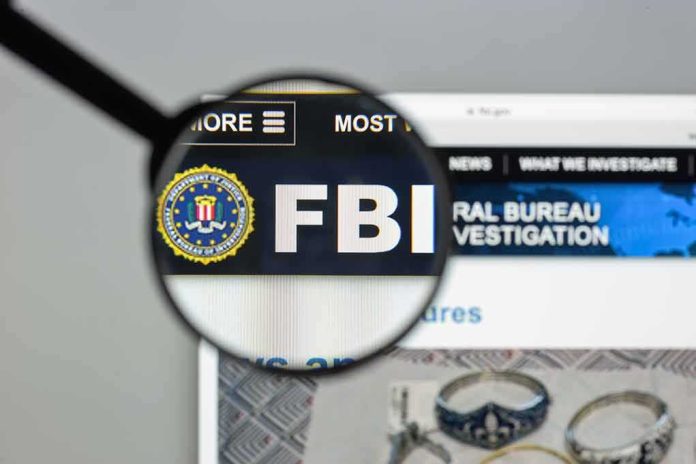
FBI supervisor solicited prostitutes using government-issued devices and failed to report foreign relationships, yet criminal charges were declined in yet another example of different justice standards for federal officials.
Key Takeaways
- A former FBI special agent supervisor solicited prostitutes during both domestic and overseas assignments, using FBI-issued mobile devices for transactions
- Despite clear violations of FBI policy and potential security risks, criminal prosecution was declined for the supervisor
- This case is part of a larger pattern, as six FBI officials were previously found engaging in similar misconduct in Cambodia, the Philippines, and Thailand
- The incidents exposed FBI personnel to extortion and blackmail risks from foreign entities, creating serious national security vulnerabilities
- Officials attempted to conceal their actions, with five failing polygraph tests related to their misconduct
FBI Supervisor’s Prostitution Scandal Exposed
The Department of Justice’s Office of Inspector General has confirmed serious allegations against a former FBI special agent supervisor who hired prostitutes while on both domestic and international assignments. According to the investigative summary, the supervisor not only solicited prostitution services but compounded the offense by using an FBI-issued mobile device to facilitate these transactions. This blatant misuse of government resources demonstrates a shocking disregard for bureau protocols and ethical standards that all federal law enforcement officers are expected to uphold.
The investigation further revealed that the supervisor failed to report “close or continuous contact” with a foreign national they were dating while stationed overseas, a critical security protocol violation. Such undisclosed relationships create substantial vulnerabilities that could be exploited by foreign intelligence services. Despite these serious findings that potentially compromised national security, criminal prosecution was inexplicably declined, raising significant questions about the two-tiered justice system that appears to protect federal officials from consequences that would befall ordinary citizens.
🤡 FBI rotting from the top: even Supervisors caught using PROSTITUTES on the job
Turns out, one FBI Supervisory Special Agent was living his best double life — using taxpayer-funded trips (foreign and domestic) to hire prostitutes, even arranging transactions on his FBI-issued… https://t.co/OXTxLp1MWW pic.twitter.com/V0buHMDlTp
— Sputnik (@SputnikInt) July 2, 2025
Pattern of Misconduct Among FBI Personnel
This case is unfortunately not an isolated incident but part of a disturbing pattern within the bureau. A previous investigation uncovered similar misconduct by six FBI officials who solicited or engaged with prostitutes while on assignment in Cambodia, the Philippines, and Thailand between 2009 and 2018. These encounters occurred at various establishments including karaoke bars, massage parlors, and gentlemen’s clubs, often while the agents were officially representing the United States government abroad. Even more concerning, some officials were provided prostitutes directly by foreign law enforcement officials, creating obvious compromise situations.
“While we cannot comment on specific employee matters, all FBI employees are held to the highest standards of professional and ethical conduct,” stated FBI.
The bureau’s public statement about “highest standards” rings hollow when contrasted with the reality of what occurred. One official admitted to having sex with prostitutes sent directly to his villa by foreign law enforcement partners, while another negotiated sexual services for colleagues before engaging with a prostitute himself. Rather than maintain the moral authority expected of America’s premier law enforcement agency, these officials created compromising situations that directly undermined American security interests and damaged the FBI’s credibility both domestically and internationally.
Security Risks and Failed Accountability
The 37-page Report of Investigation, though heavily redacted, paints a disturbing picture of both the misconduct and the attempts to conceal it. When questioned about their activities, the officials were not forthcoming with investigators from the DOJ’s Inspector General’s Office. Polygraph tests indicated that five officials either lacked candor or outright lied about their actions, demonstrating a concerning pattern of dishonesty among those entrusted with enforcing the law. This behavior violated numerous Justice Department and FBI policies while simultaneously exposing these officials to potential extortion and blackmail.
“Everyone who engaged in this inexcusable behavior was held accountable and no longer works for the FBI,” sated FBI
One official’s statement captured in the report acknowledged that foreign officials had “tried to leverage him as a result of their providing him with a prostitute, adding this is a ‘cultural thing unfortunately.'” This casual dismissal of a serious security compromise highlights the dangerous naivety or willful disregard that characterized these incidents. When confronted with evidence, officials offered conflicting statements, initially denying any involvement before later admitting to various degrees of misconduct. While the FBI claims that “appropriate disciplinary actions” were taken, the absence of criminal charges suggests a protective attitude toward bureau personnel that wouldn’t be extended to ordinary citizens.
Systemic Issues Across Federal Agencies
The FBI is not alone in facing these scandals involving overseas misconduct. Similar incidents have plagued other federal agencies including the Secret Service and DEA, suggesting a systemic problem within federal law enforcement culture when operating abroad. In response to these repeated embarrassments, the FBI claims to have revised its selection and training processes for agents working overseas. However, the recurring nature of these scandals across multiple agencies raises serious questions about whether the federal government is genuinely committed to addressing the root causes of this behavior.
“Allegations of misconduct are taken seriously and referred to the Inspection Division or the Department of Justice Office of the Inspector General,” stated FBI.
While the consequences for these officials included resignations, retirements, and removal from positions, the lack of criminal prosecution reinforces the perception of a two-tiered justice system that protects government officials. The fact that these behaviors continued for nearly a decade before being addressed suggests institutional tolerance rather than rigorous oversight. President Trump’s administration has consistently highlighted the need for accountability within federal agencies, particularly the FBI, which has been plagued by political bias and ethical lapses. This case further demonstrates why Americans are increasingly skeptical of federal law enforcement institutions that appear to operate under different standards than those they enforce on citizens.



